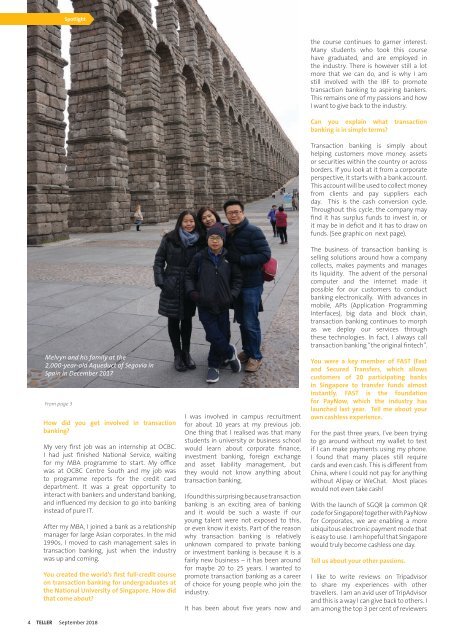September Teller 1
Create successful ePaper yourself
Turn your PDF publications into a flip-book with our unique Google optimized e-Paper software.
Spotlight<br />
From page 3<br />
the course continues to garner interest.<br />
Many students who took this course<br />
have graduated, and are employed in<br />
the industry. There is however still a lot<br />
more that we can do, and is why I am<br />
still involved with the IBF to promote<br />
transaction banking to aspiring bankers.<br />
This remains one of my passions and how<br />
I want to give back to the industry.<br />
Melvyn and his family at the<br />
2,000-year-old Aqueduct of Segovia in<br />
Spain in December 2017<br />
From page 3<br />
How did you get involved in transaction<br />
banking?<br />
My very first job was an internship at OCBC.<br />
I had just finished National Service, waiting<br />
for my MBA programme to start. My office<br />
was at OCBC Centre South and my job was<br />
to programme reports for the credit card<br />
department. It was a great opportunity to<br />
interact with bankers and understand banking,<br />
and influenced my decision to go into banking<br />
instead of pure IT.<br />
After my MBA, I joined a bank as a relationship<br />
manager for large Asian corporates. In the mid<br />
1990s, I moved to cash management sales in<br />
transaction banking, just when the industry<br />
was up and coming.<br />
You created the world’s first full-credit course<br />
on transaction banking for undergraduates at<br />
the National University of Singapore. How did<br />
that come about?<br />
4 TELLER <strong>September</strong> 2018<br />
I was involved in campus recruitment<br />
for about 10 years at my previous job.<br />
One thing that I realised was that many<br />
students in university or business school<br />
would learn about corporate finance,<br />
investment banking, foreign exchange<br />
and asset liability management, but<br />
they would not know anything about<br />
transaction banking.<br />
I found this surprising because transaction<br />
banking is an exciting area of banking<br />
and it would be such a waste if our<br />
young talent were not exposed to this,<br />
or even know it exists. Part of the reason<br />
why transaction banking is relatively<br />
unknown compared to private banking<br />
or investment banking is because it is a<br />
fairly new business – it has been around<br />
for maybe 20 to 25 years. I wanted to<br />
promote transaction banking as a career<br />
of choice for young people who join the<br />
industry.<br />
It has been about five years now and<br />
Can you explain what transaction<br />
banking is in simple terms?<br />
Transaction banking is simply about<br />
helping customers move money, assets<br />
or securities within the country or across<br />
borders. If you look at it from a corporate<br />
perspective, it starts with a bank account.<br />
This account will be used to collect money<br />
from clients and pay suppliers each<br />
day. This is the cash conversion cycle.<br />
Throughout this cycle, the company may<br />
find it has surplus funds to invest in, or<br />
it may be in deficit and it has to draw on<br />
funds. (See graphic on next page).<br />
The business of transaction banking is<br />
selling solutions around how a company<br />
collects, makes payments and manages<br />
its liquidity. The advent of the personal<br />
computer and the internet made it<br />
possible for our customers to conduct<br />
banking electronically. With advances in<br />
mobile, APIs (Application Programming<br />
Interfaces), big data and block chain,<br />
transaction banking continues to morph<br />
as we deploy our services through<br />
these technologies. In fact, I always call<br />
transaction banking “the original fintech”.<br />
You were a key member of FAST (Fast<br />
and Secured Transfers, which allows<br />
customers of 20 participating banks<br />
in Singapore to transfer funds almost<br />
instantly. FAST is the foundation<br />
for PayNow, which the industry has<br />
launched last year. Tell me about your<br />
own cashless experience.<br />
For the past three years, I’ve been trying<br />
to go around without my wallet to test<br />
if I can make payments using my phone.<br />
I found that many places still require<br />
cards and even cash. This is different from<br />
China, where I could not pay for anything<br />
without Alipay or WeChat. Most places<br />
would not even take cash!<br />
With the launch of SGQR (a common QR<br />
code for Singapore) together with PayNow<br />
for Corporates, we are enabling a more<br />
ubiquitous electronic payment mode that<br />
is easy to use. I am hopeful that Singapore<br />
would truly become cashless one day.<br />
Tell us about your other passions.<br />
I like to write reviews on Tripadvisor<br />
to share my experiences with other<br />
travellers. I am an avid user of TripAdvisor<br />
and this is a way I can give back to others. I<br />
am among the top 3 per cent of reviewers



